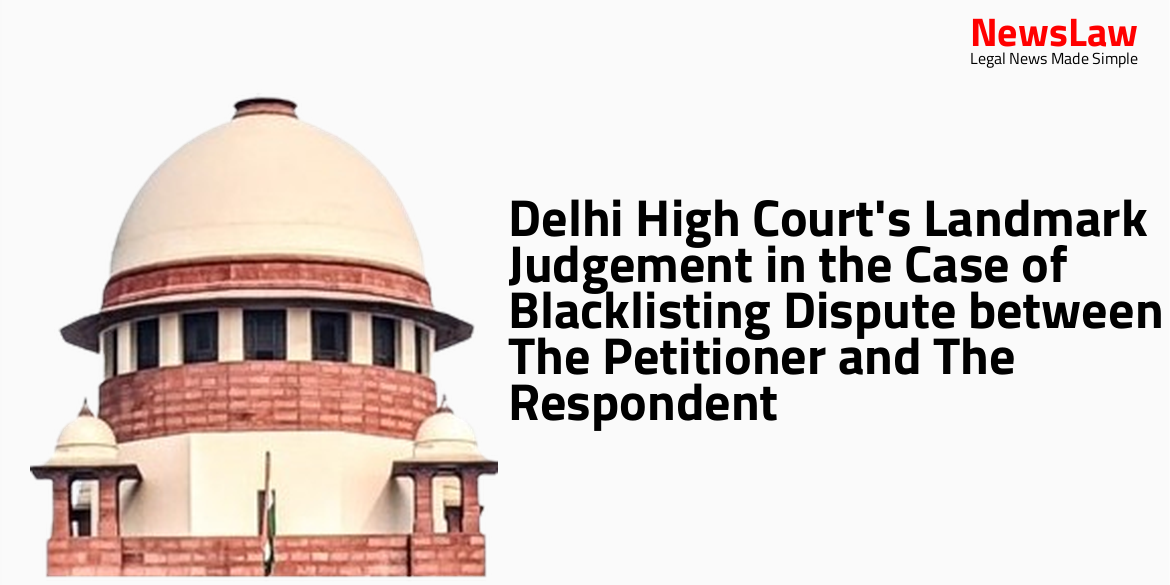The court’s detailed legal analysis in a recent case delves into the implications of Section 24(2) of the Act 2013 on land acquisition proceedings. The judgement sheds light on key aspects such as compensation, possession, and the interplay of different legal provisions in land acquisition matters. Through a critical examination of the law, the court’s decision provides insights into the complexities of land acquisition cases and sets a precedent for future legal interpretations in similar scenarios.
Facts
- The Union of India and Land Acquisition Collector challenged the High Court’s decision declaring that acquisition proceedings had lapsed.
- The High Court relied on Section 24(2) of the Act 2013 to declare the proceedings as lapsed.
- The appellants, feeling aggrieved, have filed the present appeal against the High Court’s decision.
Also Read: Challenging Legal Presumptions in Negotiable Instrument Cases
Issue
- The possession of the land in question was taken over by the appropriate authority in 1987.
Also Read: Legal Analysis of Admission Irregularities in Educational Institutions
Analysis
- The proviso to Section 24(2) of the 2013 Act is to be treated as part of Section 24(2), not part of Section 24(1)( b ).
- Compensation under the 2013 Act has to be paid to the ‘landowners’ as on the date of notification for land acquisition under Section 4 of the 1894 Act in case of non-deposit with respect to the majority of holdings for five years or more.
- If a person has been tendered compensation under Section 31(1) of the 1894 Act, they cannot claim that acquisition has lapsed under Section 24(2) due to non-payment or non-deposit of compensation in court.
- The provisions of Section 24(2) providing for a deemed lapse of proceedings apply if authorities have failed to take possession and pay compensation for five years or more before the 2013 Act came into force.
- Section 24(2) does not give rise to a new cause of action to question the legality of concluded proceedings of land acquisition.
- The mode of taking possession under the 1894 Act and as contemplated under Section 24(2) is by drawing of inquest report/memorandum.
- Interest under Section 34 of the 1894 Act can be granted if the obligation under Section 31 of the Act has not been fulfilled.
- Once possession has been taken under Section 16 of the 1894 Act, the land vests in the State and there is no divesting provided under Section 24(2) of the 2013 Act.
- Non-deposit of compensation in court does not result in the lapse of land acquisition proceedings.
- The High Court declared that the acquisition proceedings for the subject land had lapsed under Section 24(2) of the Act, 2013.
- The High Court cited the decisions of the Supreme Court in the cases of Pune Municipal Corporation vs. Harakchand Misirimal Solanki and Sree Balaji Nagar Residential Association vs. State of Tamil Nadu.
- In paragraph 366 of the judgement, it was observed and held that the acquisition proceedings had lapsed.
- A Constitution Bench of the Supreme Court in the case of Indore Development Authority vs. Manoharlal and others had overruled the earlier decisions of the Supreme Court in the cases of Pune Municipal Corporation and Sree Balaji Nagar Residential Association.
- Under Section 24(1)(a) of the 2013 Act, if the award is not made by 1-1-2014, there is no lapse of proceedings.
- Compensation must be determined under the provisions of the 2013 Act.
- If the award is issued within five years excluding the period covered by a court’s interim order, proceedings will continue under the 1894 Act as if it has not been repealed.
- The acquisition proceedings in respect of the subject land have not lapsed under Section 24(2) of the 2013 Act.
- The land remains vested with the appellant.
- The High Court’s judgment and order declaring the lapse of acquisition proceedings and directing compensation payment are quashed and set aside.
Also Read: Land Compensation Enhancement Case Summary
Decision
- Original writ petitioners entitled to compensation under the Land Acquisition Act, 1894 as per Award No.102/1986-87.
- Original writ petitioners can seek enhancement of compensation in accordance with the law.
- Present appeal allowed, dismissing the writ petition filed by the private respondents before the High Court.
Case Title: UNION OF INDIA Vs. SUBHASH CHANDER SEHGAL (2022 INSC 849)
Case Number: C.A. No.-005439-005439 / 2022



